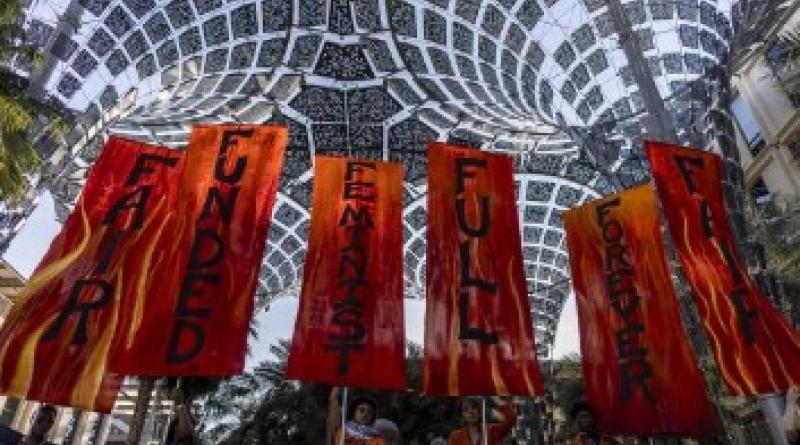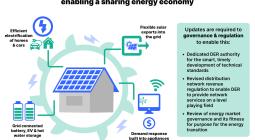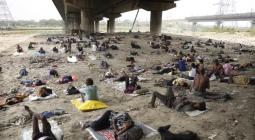Decolonising the global economic architecture: The prerequisite for a just transition

SUMMARY
- Global South faces severe structural deficiencies that weaken its economic sovereignty, putting it at mercy of neo-colonial global financial architecture
- World Bank and IMF have no vision for decolonising African economies or addressing the roots of external debt problems
- Global South’s response to 21st century polycrisis requires structural transformation that ensures – inter alia – food and energy sovereignty
The World Bank Group and International Monetary Fund (WBG and IMF) were created in 1944 when most of Africa was still colonised. No fundamental changes were made to these institutions when they first held their Annual Meetings on the African continent in Nairobi 50 years ago, and no such changes were announced at the second Africa-based Annual Meetings in Marrakech, Morocco, in October 2023 that would lead to a decolonised global financial architecture any time soon (see Dispatch Annuals 2023).
The Global South faces severe structural economic deficiencies that weaken its economic sovereignty and put it at the mercy of a neo-colonial international trade, finance and investment architecture, as discussed in the May report titled Just Transition: A Climate, Energy and Development Vision for Africa, which I co-authored as part of the Independent Expert Group on Just Transition and Development. This is illustrated with one simple statistic: The global economic architecture annually extracts $2 trillion of net financial flows from the Global South to the Global North.
These negative net financial flows are the direct result of the role that was historically imposed on the Global South as the place: 1) where the industrialised world can acquire cheap raw materials; 2) where industrial output from the Global North can be dumped in a large consumer market; 3) for low-cost tourist destinations; and 4) for outsourcing obsolete technologies, and low-tech, low labour-cost, assembly-line manufacturing in the name of “development” and “cooperation”, guaranteeing the Global South remains locked at the bottom of the global value chain.
New Global South-led development paradigm sorely needed
If the Global South does not articulate a forward-looking vision for a just, equitable and sustainable 21st century, this will ensure that we fall prey to the strategic vision of other major economic powers that are comfortable seeing us play the same role we played in the past (see Observer Spring 2023). The good news is that this polycrisis is a reminder that neither the Global South nor the Global North can afford to ignore these major imbalances in terms of financial, social and ecological stability.
The Global South’s response to the 21st century polycrisis requires structural transformation to repair three major economic deficiencies: 1) food sovereignty; 2) energy sovereignty; and 3) excessive reliance on low value-added manufacturing and purely extractive industries. These deficiencies amount to structural trade deficits, depreciating Global South currencies, and increasing costs for critical imports such as food, fuel and medicine. These force Global South governments to increase food and fuel subsidies to protect their most vulnerable and borrow dollars in a desperate attempt to artificially stabilise their exchange rate. This dynamic brings the Global South into the vicious circle of growing external debt that culminates in sovereign debt crises, reducing fiscal capacities to invest in national priorities, strengthening the grip of global financial institutions, and further weakening economic sovereignty (see Observer Winter 2023).
While the focus on the external debt crisis is important, it is crucial that we recognise it as a symptom of the three economic deficiencies outlined. So when we speak of debt restructuring, concessional finance and even debt cancellation, we must acknowledge that without addressing the root causes of external debt, we guarantee that new sovereign debt crises will continue to emerge and global imbalances will persist.
The Global South must continue to demand a just global financial architecture, for new Special Drawing Rights (SDRs) allocations to go to developing countries (see Briefing, Reconceptualising Special Drawing Rights as a tool for development finance), for the $100 billion in climate finance pledged to be fulfilled, for more favourable terms of finance, for scaling up funding for the Green Climate Fund, and for immediate financing at scale for the Loss and Damage Fund. However, none of this can replace the need for the strategic structural transformation of the Global South. The Global South has the opportunity to put forward a united front with an unbreakable commitment to collective action on debt, climate finance, financial architecture negotiations, and, most importantly, on access and use of strategic minerals that are under the sovereign control of Southern nations. These should be leveraged for South-South industrial policies rather than exported as raw materials to secure the economic hegemony of the Global North.
Finally, it is vital that the Global South rejects false solutions that have been imposed on us. Policies that encourage exports end up leading to more imports of fuel, capital equipment and intermediate inputs. Policies that promote foreign direct investment end up increasing imports of fuel for energy production and transportation. Policies that promote the liberalisation of financial services end up hurting domestic investors and inviting speculative attacks from abroad. All of these policies masquerade as solutions, when they are in fact structural traps.
After decades of “leadership” by international financial institutions via development finance, loans, and technical “assistance” and “cooperation”, the fact that the Global South is stuck in a vicious debt cycle means one of two things: a) incompetence, or b) intentional entrapment. The WBG and IMF have no vision for decolonising African economies or addressing the roots of our external debt problems. This should galvanise efforts across the Global South to build alternative financial institutions that would challenge the hegemony of the global trade, investment, finance, and taxation architectures, and would render the World Bank and IMF redundant institutions that must either be radically transformed or dismantled.





